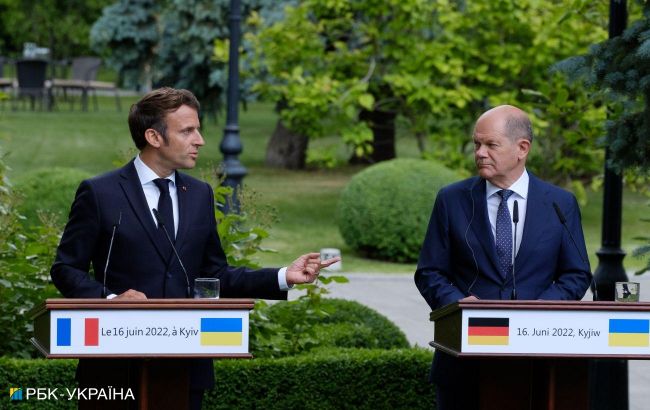Macron and Scholz are at odds, which could harm Ukraine
 French President Emmanuel Macron and German Chancellor Olaf Scholz (Vitalii Nosach, RBC-Ukraine)
French President Emmanuel Macron and German Chancellor Olaf Scholz (Vitalii Nosach, RBC-Ukraine)
President Emmanuel Macron of France and Chancellor Olaf Scholz of Germany are at odds with each other, a conflict that could potentially harm Ukraine, according to Bloomberg.
At the Paris summit of European leaders, Macron called for increased assistance to Ukraine, but the French leader's idea of possible deployment of Western troops in Ukraine contradicts the desires of Scholz's office.
Macron's speech revealed his animosity towards Scholz, especially when he mentioned allies who only offered Ukraine "helmets and sleeping bags" at the eve of war, implicitly referring to Germany.
According to sources, Macron views Scholz as a leader lacking boldness and ambition, unable to think beyond the short term. Bloomberg writes about a "lack of chemistry" between them from day one.
Close aides to the Chancellor also acknowledge their discord. Berlin perceives Macron as a monarchic figure who is better at presenting grand visions than implementing them.
Bloomberg adds that the conflict between European leaders is happening at a challenging moment for Ukraine.
A spokesperson for the German government told the publication that the differences arose not between Macron and Scholz but between the French president and a larger group who found his comments inappropriate.
"Regardless of this, and regardless of the very different basic types that Scholz and Macron are, they get along well and trust each other,," the spokesperson said.
The Elysee did not return a request for comment.
Backstory
French President Emmanuel Macron did not rule out NATO deploying troops to assist Ukraine. According to him, the main problem lies in the lack of consensus on this issue at the moment.
Several NATO countries have already spoken out against this idea, including Germany, Czechia, Bulgaria, Spain, and Italy.
However, there are countries willing to consider doing so, such as Lithuania, Latvia, and Estonia.
Canada, also a NATO member, stated its readiness to send troops to Ukraine, but only to train Ukrainian defenders far from the front lines.

